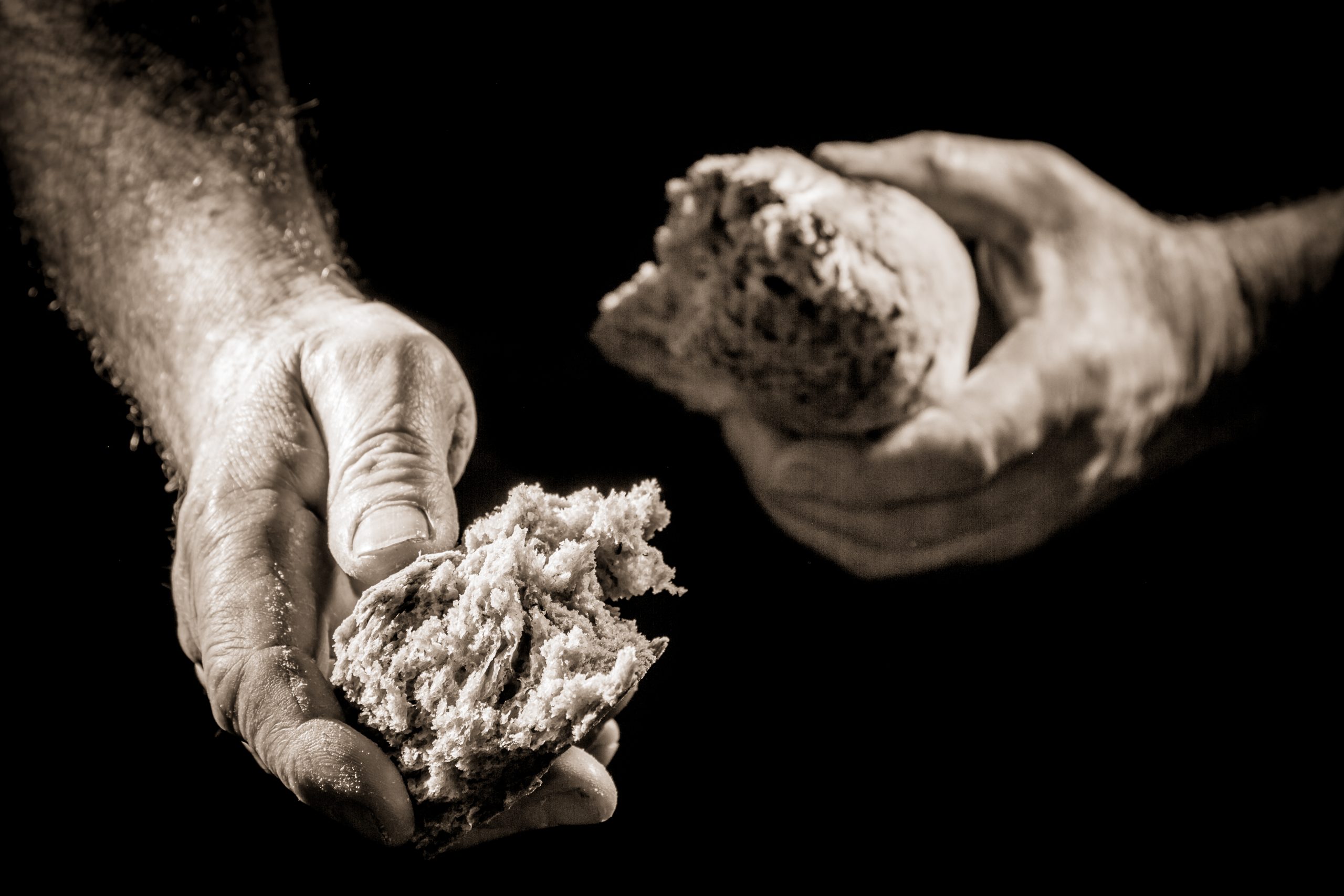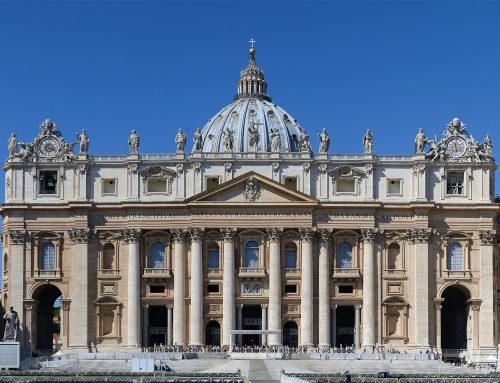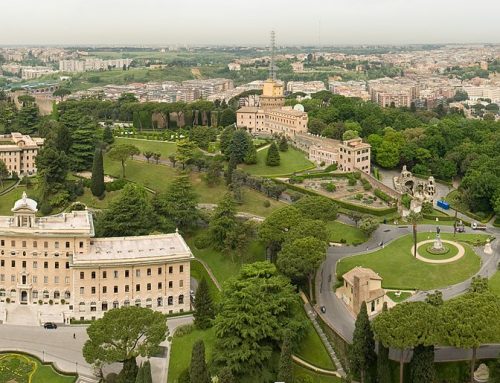The people Jesus addressed understood what it meant to be hungry or thirsty. In that region, few were prosperous, and more than likely, at one time or another, those listeners that day had experienced the kind of hunger he’s talking about here. They lived in poverty without grocery stores and refrigerators and running water. They may have gone days without food. They were well acquainted with hunger pangs.
We have never known true hunger like these people. To us, hunger means waiting ten extra minutes for the rolls to come out of the oven, or thirty minutes for the preacher to finish. Hunger for most of us is that sensation in your stomach that makes us stop at McDonald’s for fries and a Coke even though we just ate two hours ago. We are the best fed people on the face of the earth. Our problem isn’t finding something to eat, it’s losing the fat that comes from eating too much or eating the wrong types of food. Jesus uses the metaphors of eating and drinking as the motivating power to live a righteous life. Let me make four observations that help us fill the spiritual hunger of our hearts that leads to a righteous life.
First, no one can force you to eat. The adage is true: You can lead a horse to water, but you can’t make him drink. Now, granted for most of us, it does not take much forcing to eat. Like food, you must want to live a righteous life. The verbs for hunger and thirst mean an intense desire, an ardent craving, and all-consuming pursuit. It is as though you are parched, and nothing will stop you from getting to the water fountain to drink. Or you are so hungry you will pursue food at all costs. It’s a desperate kind of hunger.
In a different context, to describe a person who is ambitious, passionate, and desperate to achieve or to succeed we will say “he’s hungry.” It is that same kind of passion and drive that should motive the believer to pursue righteousness.
Listen to the psalmist, David, to see if you can hear the longing, the drive, in his pursuit of righteousness:
As a deer longs for streams of water, so I long for You, God. I thirst for God, the living God. When can I come and appear before God (Psa. 42:1-2)?
God, You are my God; I eagerly seek You. I thirst for You; my body faints for You in a land that is dry, desolate, and without water (Psa. 63:1).
Hunger and thirst are intense desires. It is that same intensity that we need in seeking righteousness. Do you have that kind of desperation for a truly Christian lifestyle that changes us from the inside out so that we no longer seek the praise of men but causes us to seek God’s approval above everything else?
Can you say to Jesus, “I not only want you, but I need you. And I not only need you, but I must also have you”?
Next, appetites aren’t filled until you do something about it. It is one thing to intellectually say I am hungry and desire food. It is quite another to take the steps to satisfy your hunger and to quench your thirst. At some point you must go eat or drink.
A loss of appetite is a sign of illness. Physically, we know something is wrong when we have no desire to eat. The same is true spiritually. When we no longer hunger and thirst for time alone with God through Bible reading and prayer, or aren’t committed to the worship of God, or fail to get alarmed over our sinful condition and the sin of the world, we see clear signs of spiritual sickness. When we no longer take the appropriate action of developing and deepening our relationship with God, a warning light – like on the dashboard of your car – needs to be illuminated, signaling that something is wrong. We need help.
The action we need to take is to go to the source – the bread of life. Jesus said, “I am the bread of life. No one who comes to Me will ever be hungry, and no one who believes in Me will ever be thirsty again … I am the living bread that came down from heaven. If anyone eats of this bread he will live forever. The bread that I will give for the life of the world is My flesh” (John 6:35, 51). When we are spiritually hungry, we will come to the source of spiritual life – Jesus himself. Our real hunger is for God. Saint Augustine was right when he said: “O God, you have made us for yourself, and our hearts are restless until they find rest in you.”
Herein is a fundamental problem. To fill this spiritual hunger and thirst, many people are going to the wrong places – pleasure, performance, or possessions; living on the junk food of another job, another marriage, another vacation; or thinking, “All I need to do is read the Bible every now and then, attend Sunday school and worship every once and a while, serve in ministry when I feel like it.” God says, “Why do you spend your money on junk food, your hard-earned cash on cotton candy? Listen to me, listen well: Eat only the best, fill yourself with only the finest” (Is. 55:2 The Message).
Many people today are looking for satisfaction in all the wrong places, trying to satisfy the craving of their hearts with junk of this world, or in the church and are spiritually malnourished. You need to come to Jesus – the source of life itself. You need to feed upon Him with balanced, daily diet of prayer and the study of God’s Word. You need to drink from His cup through life giving worship. You need to feast on His love and his grace, His forgiveness, and His power.
The third observation is that grammatically Jesus expressed the two Greek verbs, “to hunger” and “to thirst,” as present participles, which implies continuous action. Read the fourth beatitude closely: Those who are filled are not those who have their hunger and thirst met, but those who are continually hungering and thirsting. A person doesn’t stop hungering and thirsting for righteousness once he or she has crossed the line of faith. It is a constant pursuit to live a life of righteousness, to yearn to be more and more like Christ.
Are you hungering and thirsting for righteousness? Is it a continual pursuit? Are you coming back for more? I have discovered that hungering and thirsting for righteousness is like a narcotic. You get hooked. You become addicted. You need more. You keep coming back. Once you have encountered the living God nothing else satisfies. You want more and more of him.
John MacArthur said, “If you claim a relationship with Christ but you aren’t hungering and thirsting for righteousness, you need to honestly question whether you know Him.”
Lastly, believers don’t seek bits and pieces of righteousness. They seek all the righteousness of Christ in their desire to be like him.
What Jesus is saying is not “Give me a piece of bread;” but, rather, “Give me the whole loaf.” Literally Matthew 5:6 could read, “Blessed are those who hunger and thirst after all righteousness.” The Christian is never satisfied because no matter how much righteousness he has he doesn’t have all that is available.
The person who hungers and thirsts after righteousness wants it all. They want all of God.
Could that be the problem with too many Christians, today? We just want enough of God to appease not to change us. We want enough of God to get us into right standing, avoiding the fire of hell, but not enough to bring on righteousness – the kind that would radically change our lives. As long as it is superficial change, we’re okay. A little cosmetic surgery is fine. Any more than that we’re uncomfortable. We are like Wilbur Rees who wrote
Are you ready to take all of God? If so, then, you will receive the benefit of this Beatitude. Next is the third and final principle…the promise of fulfillment.
- The Possibility of Righteousness - October 10, 2024
- The Power of Hunger - October 9, 2024






